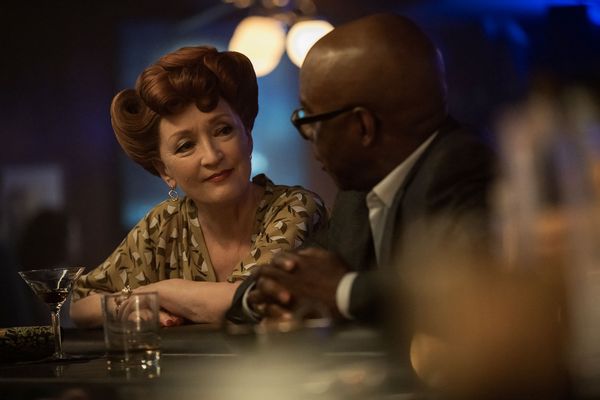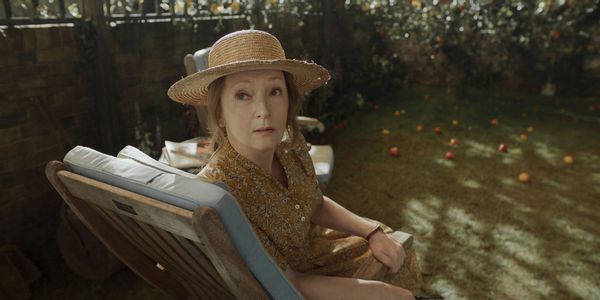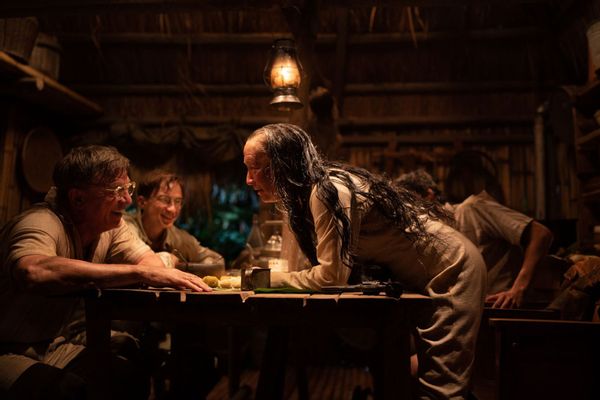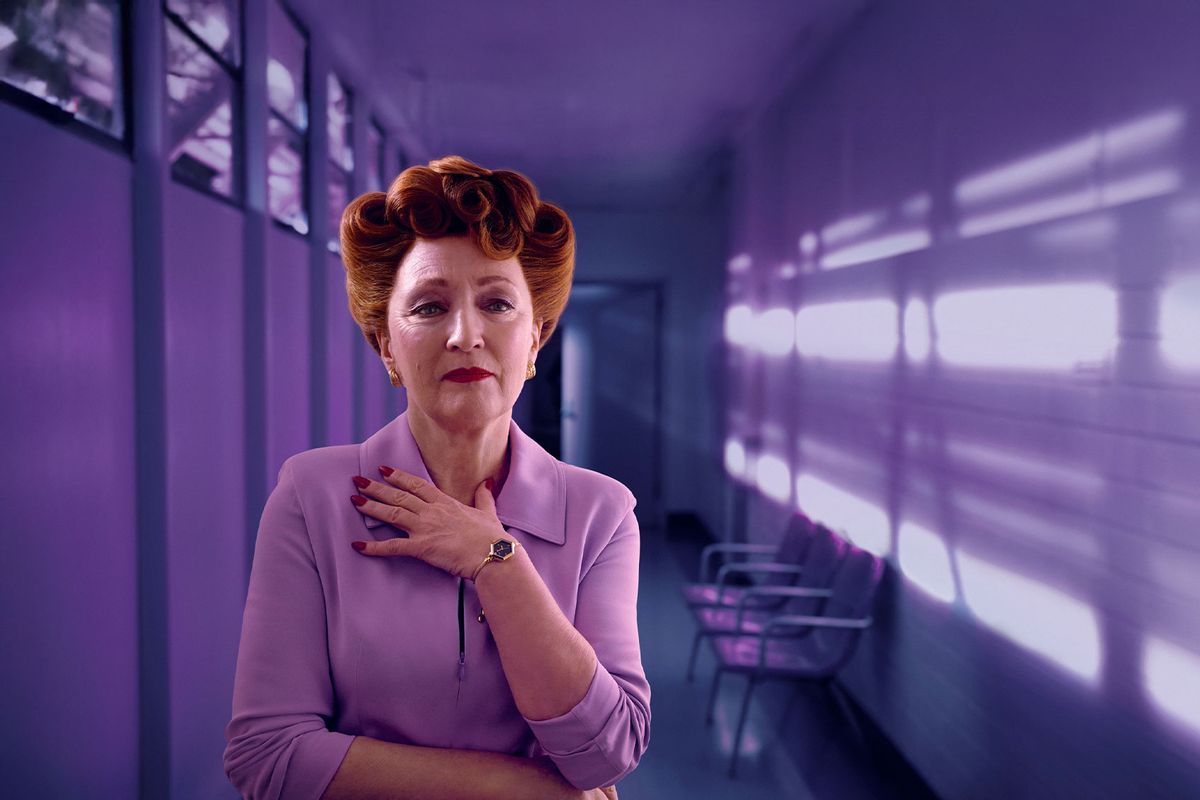Unless you’re Kim Kardashian playing a high-powered publicist/devil-worshipping witch, hilariously named Siobhan Corbyn, it’s hard to stand out in a Ryan Murphy show. (To anyone who tapped out of “American Horror Story” long ago: Yes, that’s a real thing that happened last season, and she was somehow the best part.) Let’s just say there’s a lot of Murphy programming on television these days, and the majority of the series are long-winded, long-running or just plain long in the tooth. And while I've been trying my hardest for years to abandon Murphy’s projects altogether, they keep reeling me back in with their exceptional, unexpected casting.
She has largely eschewed the typical parts for women her age, choosing instead to veer toward the peculiar and thrilling.
While Kardashian’s role was as delicious and ephemeral as a piece of cotton candy, Lesley Manville’s part in Murphy’s series “Grotesquerie” was the real substantial meal. Manville, one of the industry’s most unassuming titans, initially seemed like an odd fit for a Murphy project — especially one that, on its face, was more like a combination of the television mogul’s favorite buzzwords (Murder! Apocalypse! Adultery! Sex! Nuns!) than an actual show. But unpredictability has long been one of Manville’s strong suits, and the cruel, hard-nosed Nurse Redd fit perfectly into her diverse set projects from this year alone.
Alongside “Grotesquerie,” Manville had a banner year in 2024. Not only did she work with Murphy, perhaps television’s most reliable madman, but she collaborated with some of the most prestigious directors working today. In Alfonso Cuarón’s Apple TV+ limited series “Disclaimer,” Manville gave a knockout performance as a grieving mother, navigating her pain through stoic anger and going toe-to-toe with Cate Blanchett’s character in the process. Manville emerged elsewhere in an almost unrecognizable bit part in Luca Guadagino’s latest film “Queer,” a role that any actor would covet but few could pull off with the same conviction. That’s not even mentioning the fact that Manville is still a staple across the pond, popping up in Masterpiece mystery series and Britbox shows like "Sherwood," making noteworthy turns look as easy as taking out the bins.
While Manville has been working steadily for 50 years, her Oscar-nominated performance in Paul Thomas Anderson’s splendid 2018 romantic drama “Phantom Thread” sparked a long-deserved professional surge. This decade alone, Manville has taken on several of what most actors would consider to be career-defining roles. But in 2024 alone, Manville has reminded us that all great artists are beyond definition. She has largely eschewed the typical parts for women her age, choosing instead to veer toward the peculiar and thrilling. For her, it seems less about the material as a whole than it is her connection to a character; who she can be, and what she can extract from between the lines. When some would assume she’d slow down, Manville has only sped up, and her prudent desire to continue honing her craft has made her into one of the most captivating actors in the business.
 Lesley Manville as Nurse Redd in "Grotesquerie" (Prashant Gupta/FX)Before she broke through in America, Manville was a familiar face on British television for decades, cropping up in multi-episode arcs on BBC series and in quirky TV movies. (The curious might enjoy looking for her microscopic part in this strange holiday special, “Christmas Present.”) However, the Mike Leigh films “Secrets & Lies” and “Another Year” most acutely displayed the scope of Manville’s talent. She was soft and complex in Leigh’s sensitive slice-of-life films, supplying the nuance necessary to perform Leigh’s dialogue with the right amount of recognizable benevolence. Her characters were at once temporal and evergreen, believable glimpses of the human condition put to film.
Lesley Manville as Nurse Redd in "Grotesquerie" (Prashant Gupta/FX)Before she broke through in America, Manville was a familiar face on British television for decades, cropping up in multi-episode arcs on BBC series and in quirky TV movies. (The curious might enjoy looking for her microscopic part in this strange holiday special, “Christmas Present.”) However, the Mike Leigh films “Secrets & Lies” and “Another Year” most acutely displayed the scope of Manville’s talent. She was soft and complex in Leigh’s sensitive slice-of-life films, supplying the nuance necessary to perform Leigh’s dialogue with the right amount of recognizable benevolence. Her characters were at once temporal and evergreen, believable glimpses of the human condition put to film.
Manville has brought that same stirring humanity to all of her roles, but most notably in her work this century. Following “Phantom Thread,” Manville scored the delightful titular role in 2022’s “Mrs. Harris Goes to Paris,” a warm, spongy slice of mom cinema. But watching Manville’s sensational performance in that movie did come with a slight amount of apprehension. After scoring an Oscar nom for playing Cyril, the resolute sister of a renowned couturier in “Phantom Thread,” would Hollywood push Manville out of her spotlight and relegate her to sweet little grandmother roles made for matinee viewing?
Manville brought a scene-stealing warmth to “Back to Black” that would have been otherwise lost in the dark emotional dearth of such a vulturous piece of cinema.
Blessedly, such ostracism has not been the case, and one has to assume that much of that is on Manville’s part. She parlayed an Oscar nomination and a close partnership with an esteemed director like Anderson into more challenging roles, ones that demanded Manville live inside of them and work to develop her characters in ways that were similarly organic to how she cultivated Cyril. Manville spoke to Decider after the finale of “Grotesquerie” earlier this year, mentioning how excited she was to play a dual role that required her to be both savage and sexy. In her most memorable moment from the show’s 10 episodes, Manville’s Nurse Redd tells Niecy Nash-Betts’ Detective Lois Tyron a twisted love story that upends the series’ narrative to that point. Watching the sequence again, it’s hard to imagine any actor other than Manville conveying Nurse Redd’s distressing intimacy at such a high caliber.
Manville brought a similar urgency to another tragic tale earlier this year, playing Amy Winehouse’s grandmother Cynthia in Sam Taylor-Johnson’s biopic “Back to Black.” The less said about that movie the better, but among its handful of bright spots are Manville’s performance and her chemistry with Marisa Abela, who plays Winehouse. Cynthia and Amy share a special bond, as Cynthia seems to be the only one who truly understands her granddaughter. To illustrate that closeness, Manville brought a scene-stealing warmth to “Back to Black” that would have been otherwise lost in the dark emotional dearth of such a vulturous piece of cinema.
 Lesley Manville as Nancy Brigstocke in "Disclaimer" (Apple TV+)
Lesley Manville as Nancy Brigstocke in "Disclaimer" (Apple TV+)
In a career that refuses definition, it seems impossible that Manville’s work in “Disclaimer” won’t go down as some of the finest in her time.
Darker though was “Disclaimer,” perhaps one of the bleakest and most challenging works of art this year. While I found it brilliant and still unshakeable even months later, Alfonso Cuarón’s series divided audiences and critics. Well, divided them on everything that was not Manville’s performance. To give too much away would be to rob you of the opportunity to experience one of the year’s most formidable displays of craft yourself, but it’s also simply just difficult to classify such a remarkable bit of showmanship. Manville’s character Nancy Brigstocke sets forth the series’ inciting events, long after the death of her son Jonathan in an accidental drowning years prior. Cuarón tells the story nonlinearly, and because of this decision, we as viewers have the opportunity to watch Nancy’s full arc and be shaken to our cores by Manville’s gripping turn. Watching a mother receive news of the death of her son is difficult enough as it is, but seeing Nancy’s life come apart as she turns inward is — and I don’t use this word lightly — harrowing.
Sure, Manville also gets the juicy opportunity to face off against Cate Blanchett, whose character is tangentially involved in Jonathan’s death. (How, I can’t tell you). But “Disclaimer” is more than acting for Emmy clips and YouTube rabbit holes when you’ve had too much wine. Nancy’s grief ties the series together and exemplifies its most thorny themes. Manville has the rare opportunity as an actor to make something spectacular out of sheer, inexorable somberness. In a career that I’ve already noted refuses to be defined, it seems impossible that Manville’s work in “Disclaimer” won’t go down as some of the finest in her time.
Yet, one of the best things about this stage of Manville’s career is that she has the chance to surprise audiences again and again. Just over a month after her performance in “Disclaimer” rattled the bones of unsuspecting viewers, Manville popped up again in Luca Guadagnino’s “Queer,” looking like she had been playing around in a Guadagino film wig chest and selected the Mark Rylance’s unit from “Bones and All.” In the film’s third act, Manville appears as the eccentric Doctor Cotter, a botanist living in the South American jungle in the 1950s, whose stringy, gray hair is almost long enough to trail behind her. Cotter assists wayward sometimes-lovers William Lee (Daniel Craig) and Eugene Allerton (Drew Starkey) in getting ahold of yagé, a plant with hallucinogenic properties that Lee believes will finally connect the two men.
 Daniel Craig, Drew Starkey and Lesley Manville in "Queer" (A24)After a psychedelic trip that stretches far past the boundary lines of traditional intimacy, Cotter approaches Allerton to request that he and his companion stay with her longer, and in the process, Manville’s character becomes pivotal to unlocking the film’s emotional heart. “For most people it’s an opening of a door,” Cotter tells Allerton. “But for you two, it was something else. It’d be a shame not to see where it might take you.” Seeing Allerton resist her pleas, Cotter continues, “What are you so afraid of? Door’s already open, can’t close it now. All you can do is look away. But why would you?”
Daniel Craig, Drew Starkey and Lesley Manville in "Queer" (A24)After a psychedelic trip that stretches far past the boundary lines of traditional intimacy, Cotter approaches Allerton to request that he and his companion stay with her longer, and in the process, Manville’s character becomes pivotal to unlocking the film’s emotional heart. “For most people it’s an opening of a door,” Cotter tells Allerton. “But for you two, it was something else. It’d be a shame not to see where it might take you.” Seeing Allerton resist her pleas, Cotter continues, “What are you so afraid of? Door’s already open, can’t close it now. All you can do is look away. But why would you?”
With this bit of dialogue, Manville’s two best roles of her landmark year reveal their close connection. In “Queer,” Cotter knows how petrifying it can be to open yourself up to love, while in “Disclaimer,” Nancy is trying to hold onto love as it slips through her fingers, bereft realizing that she has nowhere left to put it. These characters are two sides of the same coin, and for Manville, they represent an eclectic personal taste, being explored in fascinating new ways while staying rooted in the touching humanity that made her such a halting force to begin with. How fitting that such telling performances cap off her best year yet, considering that they’re also definitive proof that Manville will always be worth watching, even if there’s no telling what she’ll do next.
Read more
about Lesley Manville's incredible career



Shares